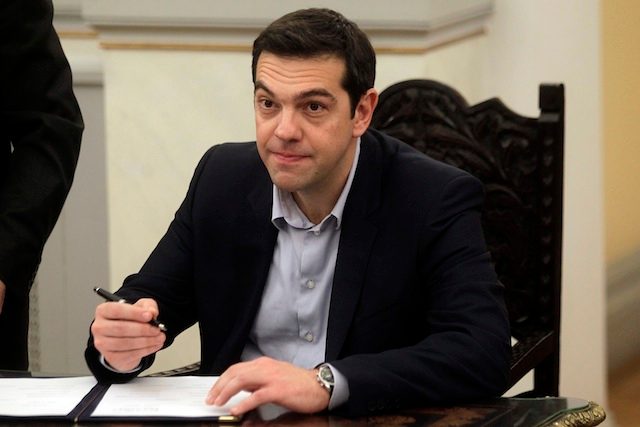SUMMARY
This is AI generated summarization, which may have errors. For context, always refer to the full article.

ATHENS, Greece – Greece’s new left-wing government can boast some high-profile allies, from Nobel economics laureates to US President Barack Obama, in its controversial drive against austerity in Europe.
Prime Minister Alexis Tsipras says Greece’s economy will never truly recover from a 6-year recession that has caused a “humanitarian crisis” in the country without growth stimulus and another cut to its massive debt.
Upon taking power last week, the new government halted key privatizations and said it would no longer accept fiscal audits from the “troika”, a staff team dispatched by its EU/ECB/IMF creditors.
Germany, which has borne the bulk of Greece’s multi-billion-euro bailout, was quick to rule out another debt cut after a 2012 operation slashed Athens’ obligations to private creditors by about 100 billion euros ($113 billion).
But 3 days before the Greek election on January 25, 18 prominent economists including Nobel prize-winners Joseph Stiglitz and Christopher Pissarides said it was a time for Greece to be granted “a fresh start”.
In a joint article in the Financial Times, they called for a cut in Greek debt now held by European states, a moratorium on interest payment and funds to finance reforms in Greece.
A few days later, US Nobel laureate Paul Krugman noted that demanding Athens create a budget surplus of 4.5% of output is akin to “extracting blood from a stone”.
Greece would need to dedicate its entire annual wealth for two years to repay a debt that stands at around 175% of national output.
Over the weekend, Obama weighed in on the debate, telling CNN: “You cannot keep on squeezing countries that are in the midst of depression.”
“At some point, there has to be a growth strategy in order for them to pay off their debts to eliminate some of their deficits,” Obama said in a message many saw as aimed at Germany.
Even the International Monetary Fund admitted in June that the surplus required under Greece’s bailout would be “difficult” to achieve.
Greek breather a ‘boost’ for Europe
“There is increasing awareness that a new development logic would not only give a breather to Greece’s asphyxiating society but also give an important boost to the European economy,” Tsipras said in Nicosia on Monday, February 2, as he began a 3-day tour of European capitals to muster support for Greece’s cause.
Tsipras, a 40-year-old former communist, has also booked meetings with Italian Prime Minister Matteo Renzi, French President Francois Hollande and European Commission President Jean-Claude Juncker this week.
Ahead of seeing Tsipras, Renzi on Monday acknowledged in a radio interview that Italy would like to see a shift from austerity to growth and investment.
But he said that “prudence” and “responsibility” were required in the talks with Greece.
Portugal and Finland have already expressed opposition to further debt relief for Athens.
Greece already has a moratorium on repaying the EFSF European bailout fund, which holds around 140 billion out of its total debt of more than 315 billion euros.
Xavier Timbeau of the French Economic Observatory (OFCE) is opposed to Tsipras’ idea of holding a European conference on Greece’s debt, noting that debt-ridden EU peers such as Portugal and Spain would naturally raise similar demands.
Instead, he sees a better solution in cutting Greece’s interest payments, which he says account for 4.5 to 5.0% of national output.
“Eliminating these payments for several years would enable (the government) to address the humanitarian crisis it justly speaks of,” he told Agence France-Presse.
The deflationary cycle in which Greece has been caught for nearly a year is another burden as it increases the country’s debt-to-GDP ratio.
Thomas Piketty, author of the bestseller “Capital in the Twenty-First Century”, recently argued that without inflation, “one would need 50 or 60 years to repay 200% of output”. – Rappler.com
Add a comment
How does this make you feel?





There are no comments yet. Add your comment to start the conversation.